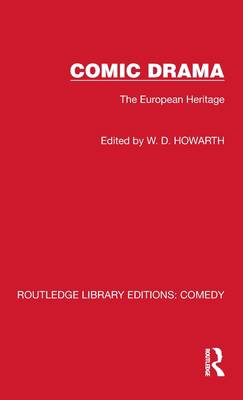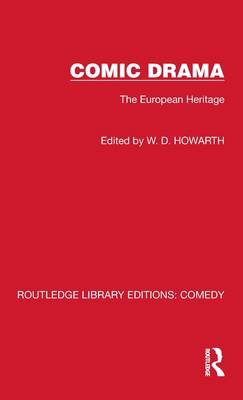
- Retrait gratuit dans votre magasin Club
- 7.000.000 titres dans notre catalogue
- Payer en toute sécurité
- Toujours un magasin près de chez vous
- Retrait gratuit dans votre magasin Club
- 7.000.0000 titres dans notre catalogue
- Payer en toute sécurité
- Toujours un magasin près de chez vous
Description
Ever since comedies were first performed in the ancient world, the definition of the term 'comedy' has been debated by both playwrights and critics. Originally published in 1978, this volume does not attempt a precise definition, but reviews the various interpretations that have been put forward through the ages, taking as evidence important theoretical writings as well as the plays themselves, and pointing out not only common features but also notable exceptions.
The comic drama of Western Europe since the Renaissance is here surveyed in a series of chapters devoted principally to the tradition of European comedy as it developed in the major national literatures. The perspective is expanded to include, on the one hand, the origins in classical Greece and Rome and, on the other, the influence of cinema, radio and television comedy at the time - American as well as European. A structural basis for the volume as a whole is provided in an analytical introduction, where the essential problems are defined: such issues as the relationship between comedy and satire, comedy and farce; the distinction between laughter and smile; the respective claims of realism and fantasy; the role of plot and of dialogue; the place of sentiment and of moral teaching; and the possibility of comic catharsis.
In this way the nature and evolution of European comedy is presented in an original and coherent form, not only offering an invaluable aid to students seeking guidance in literature of which they are not making a specialist study, but stimulating the more experienced reader to think again about familiar plays.
Spécifications
Parties prenantes
- Editeur:
Contenu
- Nombre de pages :
- 202
- Langue:
- Anglais
- Collection :
Caractéristiques
- EAN:
- 9781032216669
- Date de parution :
- 27-04-22
- Format:
- Livre relié
- Format numérique:
- Genaaid
- Dimensions :
- 140 mm x 216 mm
- Poids :
- 390 g

Les avis
Nous publions uniquement les avis qui respectent les conditions requises. Consultez nos conditions pour les avis.





